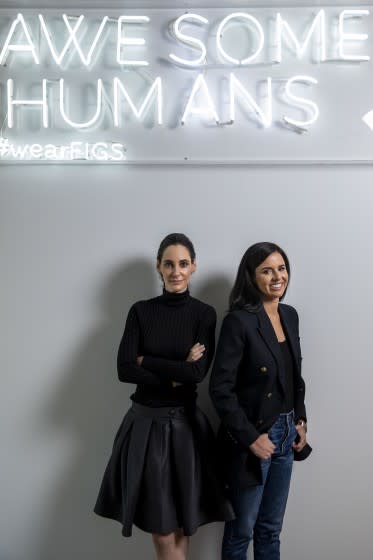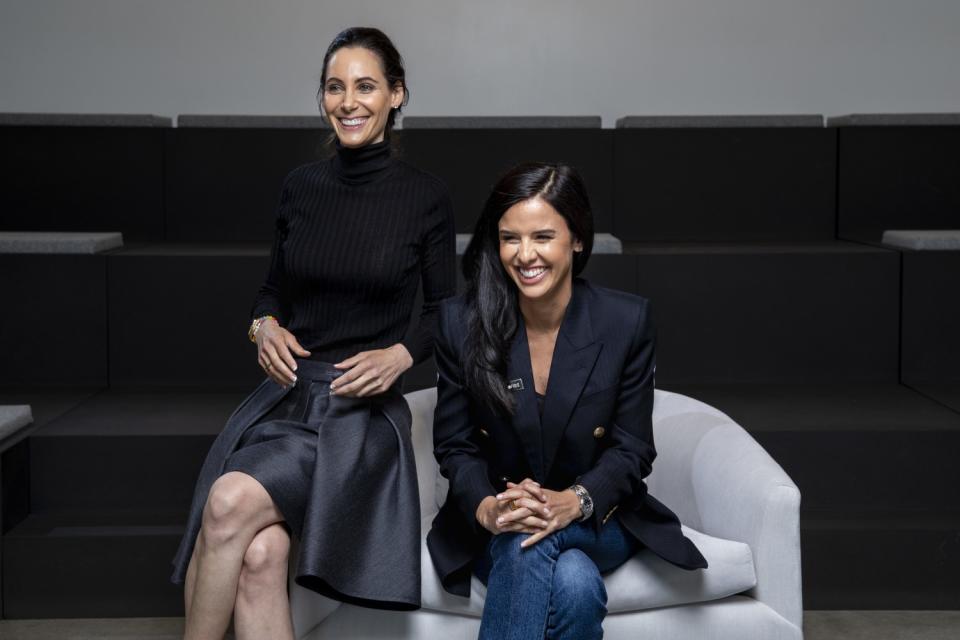How Figs co-CEOs lead a company together

The success of healthcare apparel maker Figs Inc. can be measured in multiple ways, not the least of which is how the Santa Monica company has shaken up the market for scrubs — the typically baggy shirts and pants worn by nurses and other healthcare professionals. The upstart online retailer has attracted legions of followers with more stylish cuts via a marketing strategy that celebrates its real-life customers on Instagram and other social media.
Founders Heather Hasson, 39, and Trina Spear, 37, like to parse it another way: They boast of being the first female co-founders and co-chief executives to ever take a company public. They did so in a smash May initial public offering of stock that currently values their stakes at more than $500 million each.
Hasson is a Los Angeles native and serial fashion-industry entrepreneur, while Spear, born and raised in Miami, went the Harvard Business School-Wall Street route before quitting her job at Blackstone Group to form the company.
These days, they call themselves best friends and it's not an exaggeration to say they see eye to eye, at times finishing each other's sentences. But running a company that has doubled sales each year is no small task. And there have been stumbles, including a woefully off cue marketing video amid the pandemic that depicted a woman in pink scrubs reading "Medical Terminology for Dummies" — upside down.
The company also faces a lawsuit from competitor Careismatic Brands Inc., the maker of Cherokee and other scrubs brands, alleging among other things false advertising related to the antimicrobial properties of Figs' clothing and its scrubs giveaway program.

The Times sat down with Hasson and Spear at their elegant offices prior to this week's earnings report to discuss how they manage Figs without stepping on each other's toes, the importance of being role models for young women and other topics, including their $39.6-million payday last year in a political climate that has made wealth accumulation a contentious subject. This interview has been edited and condensed for clarity and space.
So how does being co-CEOs work? How do you divvy up the work?
Spear: Heather focuses on some of our products, our branding, our marketing. I'm more focused on the operational side, the financial side, HR, legal, etc. So I think there's a very clear breakdown, but at the same time there's a lot of "OK, what do you want to do here? What do you want to do there," which is great.
Hasson: I believe that having two at the helm, you're able to run a lot faster, you're able to be more efficient. And you're also able to home in on certain things. Like if I'm not doing something, Trina could just jump in there. I don't have to do it, and vice versa.
What has it been like during the pandemic?
Spear: So it was an unprecedented time where our people, who dedicate their lives to literally saving lives, are now on the front lines fighting for everyone, every single day. And so, for us, it was an interesting time because we had to figure out ways to show up for them in more ways. We pivoted our supply chain, we made masks, we brought in N95 masks, we made face shields. We were like, "How do we protect our people?"
Hasson: It was literally just like a click on our e-commerce site and they would be able to get a mask for free and then go to the hospital with a fresh mask. We were really proud of that because it took an army to get that done.
It must have been tough also preparing for the IPO.
Hasson: We were working around the clock, really around the clock, like close to 22-hour days.
You have both repeatedly noted and taken pride in how Figs is the first company taken public by two female co-founders who are also co-CEOs. Do you think your stature makes you role models?
Hasson: I think it's very, very important that we are the role models. We are women CEOs, women founders of a company. And we need to support other female founders. I mean to say, "Hey, you can do it. This is the American dream. You can do it."

Is it any harder being a female entrepreneur or CEO?
Spear: Yeah, we're facing it right now with this lawsuit that we're gonna talk about. We're being harassed because we're young women.
Really? The lawsuit alleges you accessed confidential information about Careismatic and exaggerated the antimicrobial properties of your clothing and the extent of your scrubs giveaway program. (A judge this week dismissed several causes of action but the litigation is ongoing, with attorneys for each side in dispute over the significance of the ruling.)
Spear: I never had any confidential information. That's No. 1. No. 2, all of our scrubs are antimicrobial, and they've always been antimicrobial. And No. 3, we've donated hundreds of thousands of sets of scrubs around the world through our Threads for Threads program. Like, that's the bottom line on all three things that you mentioned.
Hasson: When you are a successful company, people will come and try to take you down.
Talking about that impulse, it seems that there was a bit of schadenfreude at play after that "Dummies" ad ran. I saw stories in the New York Post and even the British press.
Spear: It wasn’t an ad. It was a [video] image on our website. Heather and I hadn’t seen it. A junior person on the marketing team was putting up these images — 10,000 images up and down our site every month.
But did the company shoot it?
Hasson: We have "Dummy" books in our office for copywriters for our marketing team to understand medicine, right? So they just picked it up, did some funny shots. That is the antithesis of who we are. We put a lot of processes in place so that never happens again. We have stacked checks and balances in marketing.
Spear: This is the other thing that happened during the pandemic, everyone went remote. And so a lot of our processes as everyone went remote broke down, and then that kind of happened and we had to bring everything back and develop new systems and processes in place.
A pressing issue for apparel retailers are labor abuses in the supplier chain. You have suppliers all over the world. How do you keep on top of that?
Spear: We manage every single process. Our fabric is proprietary to us. We're accredited by the WRAP program — Worldwide Responsible Accredited Production — so that everything that we do across all facilities is at the highest ethical standards and highest sustainability standards. Heather, myself, the team, pre-COVID we were in Asia every quarter for weeks on end. So this is a really, really important part of our business.
Movie producer Thomas Tull has been crucial to the success of your company, investing $65 million in 2017. His Tulco investment company still holds the biggest stake in the company and Tulco Vice Chairman Marty Willhite sits on your board. What is that relationship like?
Spear: He's an entrepreneur, right? And he understands the things that matter. So some investors are very focused on the output. And a lot of investors are focused on input. How do you drive results, not just send me the report after the quarter. I think Thomas has a good balance of both, saying, "Hey, what do you guys need help with? And I'm here to be your partner."

I saw in your company's regulatory filings that you each had $39.6 million in total compensation last year. I know that your salary and bonus only totaled about $1.5 million each and the vast majority is unrealized stock options. Still, it's a big sum. Given the political climate surrounding wealth these days, why do you even draw a salary considering your large stakes in the company?
Spear: I think back to us being women and inspiring younger women or even older women, right? Inspiring people to be paid what they're worth. And that's very important. You can see women getting paid less than men, right? There is no reason why Heather and myself shouldn't be paid on par with our male peers. Our compensation is very much aligned with the market across the board.
Yes, but there's been a lot of criticism of how that comparative compensation model has led to gross pay differences between the executive suite and the average worker.
Spear: I think if you're a young girl now and looking up to Heather and myself, I would hate for that little girl to say, "Oh, they are the two that took that stand when all their male peers didn't."
Wouldn't that be a good thing?
Spear: Oh, yeah, as a woman stand down. That's a horrible message. That's a horrible message.
Hasson: But if we win, everybody else wins in our company. So it's not just like two people at the helm winning. It's everybody.
I know neither of you cashed out shares in the IPO, but has this success changed your lifestyle?
Spear: I worked at Blackstone before I joined Heather in this company. I went to Harvard Business School. I worked on Wall Street for seven years. I made money.
Hasson: I'm a huge giver. I love to donate to animal organizations and things like that. I still think about how do I make an impact? I do like nice things. I love things that are very well designed and made. And I will always, I mean, look at this office, right? But in terms of life-changing, I think life's just beginning. I think that we've got a ways to go.
For the record:
2:32 p.m. Aug. 12, 2021: An earlier version of this article said Trina Spear is 36. She is 37.
This story originally appeared in Los Angeles Times.
